
Kevin Rinz
@kevinrinz.bsky.social
Economist • Views mine alone
For the next three years, an optimistic tariff-advocate scenario looks a lot like that 2001-style recession. That’s an important point: the transition advocates mostly want to gloss over may in fact be a recession, which research suggests would have long-term consequences.
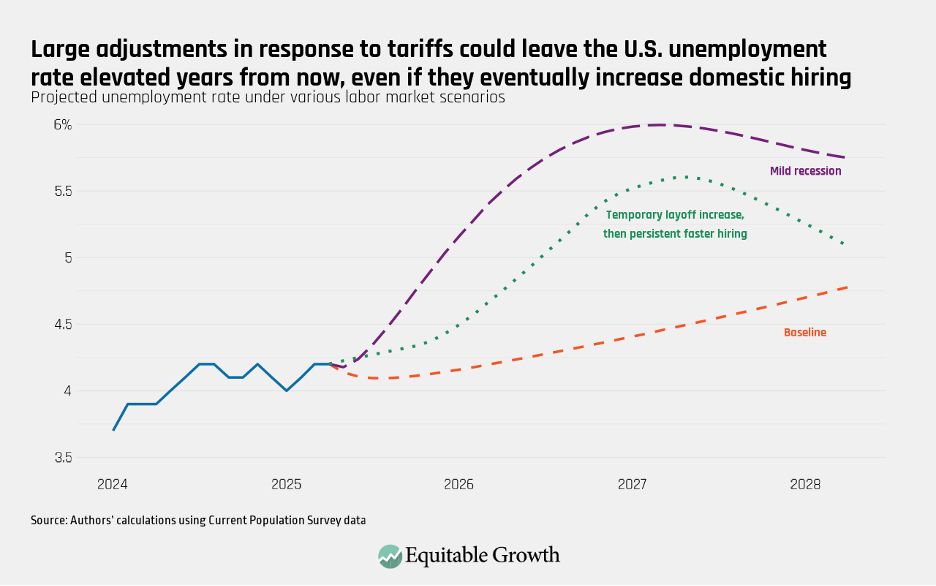
May 12, 2025 at 3:01 PM
For the next three years, an optimistic tariff-advocate scenario looks a lot like that 2001-style recession. That’s an important point: the transition advocates mostly want to gloss over may in fact be a recession, which research suggests would have long-term consequences.
There’s so much uncertainty that it’s impossible to say which of these scenarios, if any, will ultimately come to pass. But I think being concrete about what follows from reasonable changes to labor market dynamics is helpful.
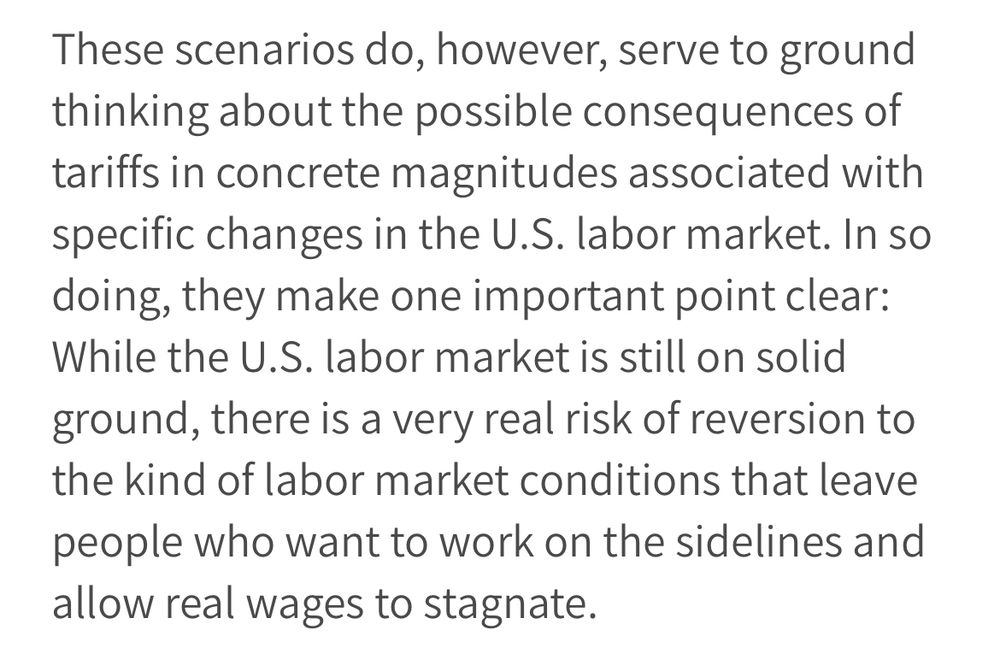
May 12, 2025 at 2:26 PM
There’s so much uncertainty that it’s impossible to say which of these scenarios, if any, will ultimately come to pass. But I think being concrete about what follows from reasonable changes to labor market dynamics is helpful.
For the next three years, an optimistic tariff-advocate scenario looks a lot like that 2001-style recession. That’s an important point: the transition advocates mostly want to gloss over may in fact be a recession, which research suggests would have long-term consequences.
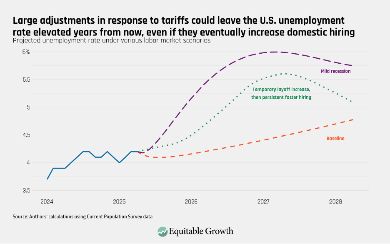
May 12, 2025 at 2:26 PM
For the next three years, an optimistic tariff-advocate scenario looks a lot like that 2001-style recession. That’s an important point: the transition advocates mostly want to gloss over may in fact be a recession, which research suggests would have long-term consequences.
Don’t want to ignore advocates for aggressive tariffs who think the short-term pain associated w adjusting to them will be outweighed by the longer-term gains associated w returning production to the US, so consider an optimistic scenario: hiring not too low, layoffs not too high
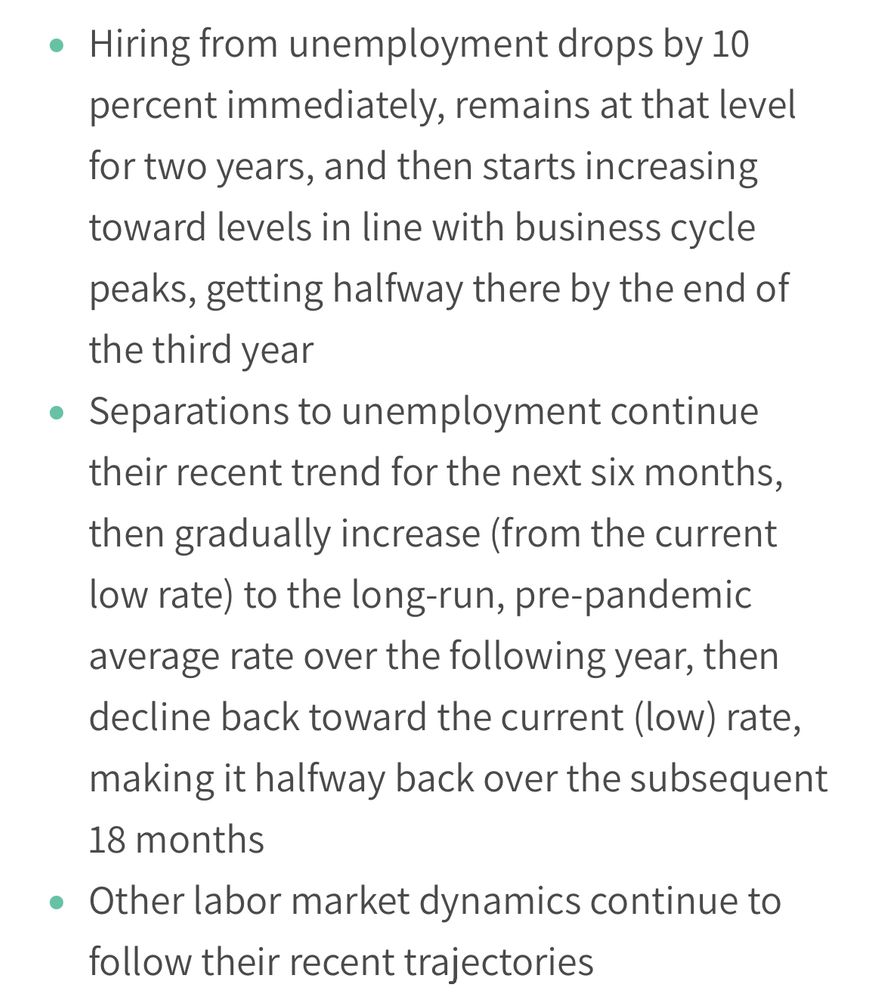
May 12, 2025 at 2:26 PM
Don’t want to ignore advocates for aggressive tariffs who think the short-term pain associated w adjusting to them will be outweighed by the longer-term gains associated w returning production to the US, so consider an optimistic scenario: hiring not too low, layoffs not too high
Tariffs pose obvious risks. Even just the uncertainty about what they’ll be could slow hiring and/or increase layoffs. Even modest adjustments to tariffs could push the unemployment rate several tenths above baseline.
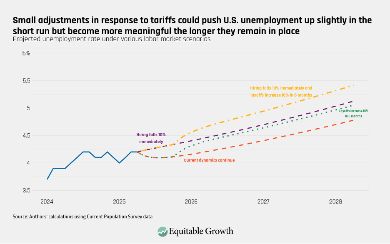
May 12, 2025 at 2:26 PM
Tariffs pose obvious risks. Even just the uncertainty about what they’ll be could slow hiring and/or increase layoffs. Even modest adjustments to tariffs could push the unemployment rate several tenths above baseline.
I’ve been doing quarterly labor market updates at @equitablegrowth.bsky.social once all the data come in, and now is a weird time for one. Tariffs are coming and going faster than data can be collected. What we have shows a labor market that still looks solid, comparable to 2019. But…
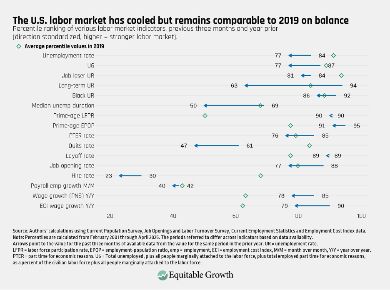
May 12, 2025 at 2:26 PM
I’ve been doing quarterly labor market updates at @equitablegrowth.bsky.social once all the data come in, and now is a weird time for one. Tariffs are coming and going faster than data can be collected. What we have shows a labor market that still looks solid, comparable to 2019. But…
3. Is anything different about occs where wages are under-predicted by job content? Yes! They’re more likely to require professional licenses, and they’re more likely to involve telework.
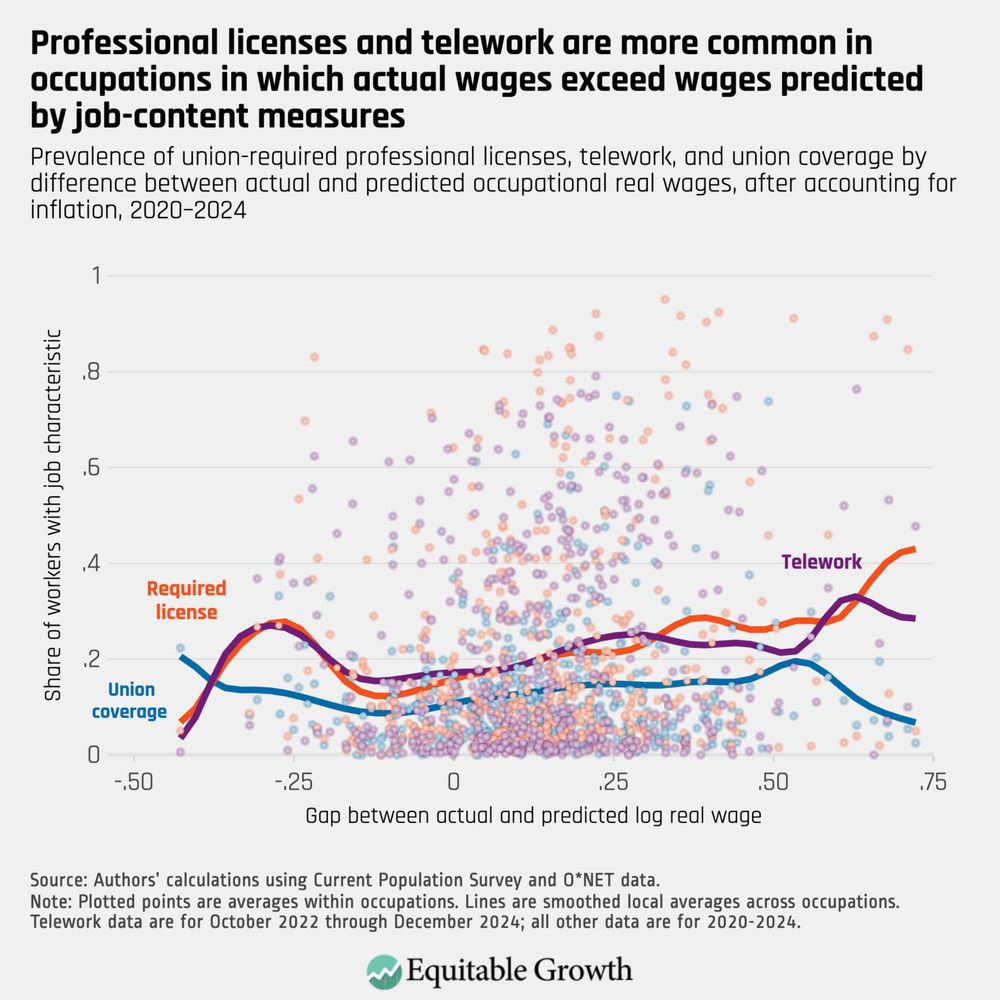
May 8, 2025 at 5:40 PM
3. Is anything different about occs where wages are under-predicted by job content? Yes! They’re more likely to require professional licenses, and they’re more likely to involve telework.
2. O*NET job content measures, despite being measured at the occupation level, explain about 30% of the variation in individual wages over the last 5 years, which is pretty good. But they systematically under-predicted wages within high-paying occupations.
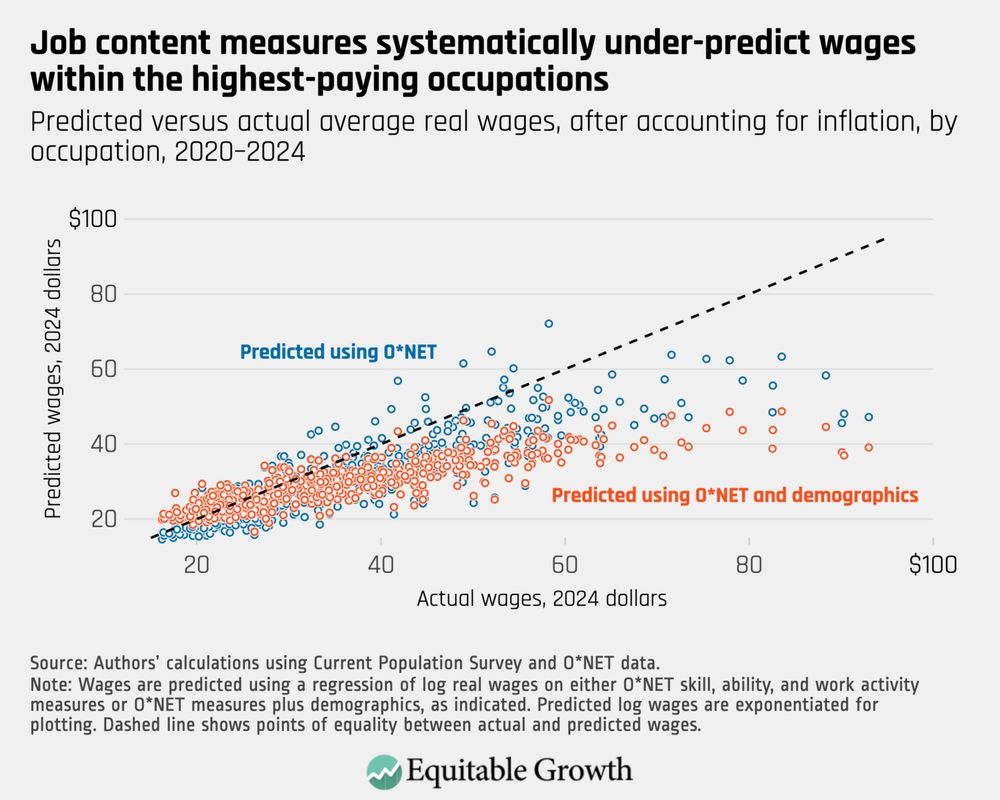
May 8, 2025 at 5:40 PM
2. O*NET job content measures, despite being measured at the occupation level, explain about 30% of the variation in individual wages over the last 5 years, which is pretty good. But they systematically under-predicted wages within high-paying occupations.
I want to highlight some cool stuff in this piece:
1) we decompose the change in real wages from the ~5 yrs before the pandemic to the ~5 yrs after. Despite all the talk about the Great Resignation/Reshuffle, changes in the content of the average job didn’t play much of a role.
1) we decompose the change in real wages from the ~5 yrs before the pandemic to the ~5 yrs after. Despite all the talk about the Great Resignation/Reshuffle, changes in the content of the average job didn’t play much of a role.
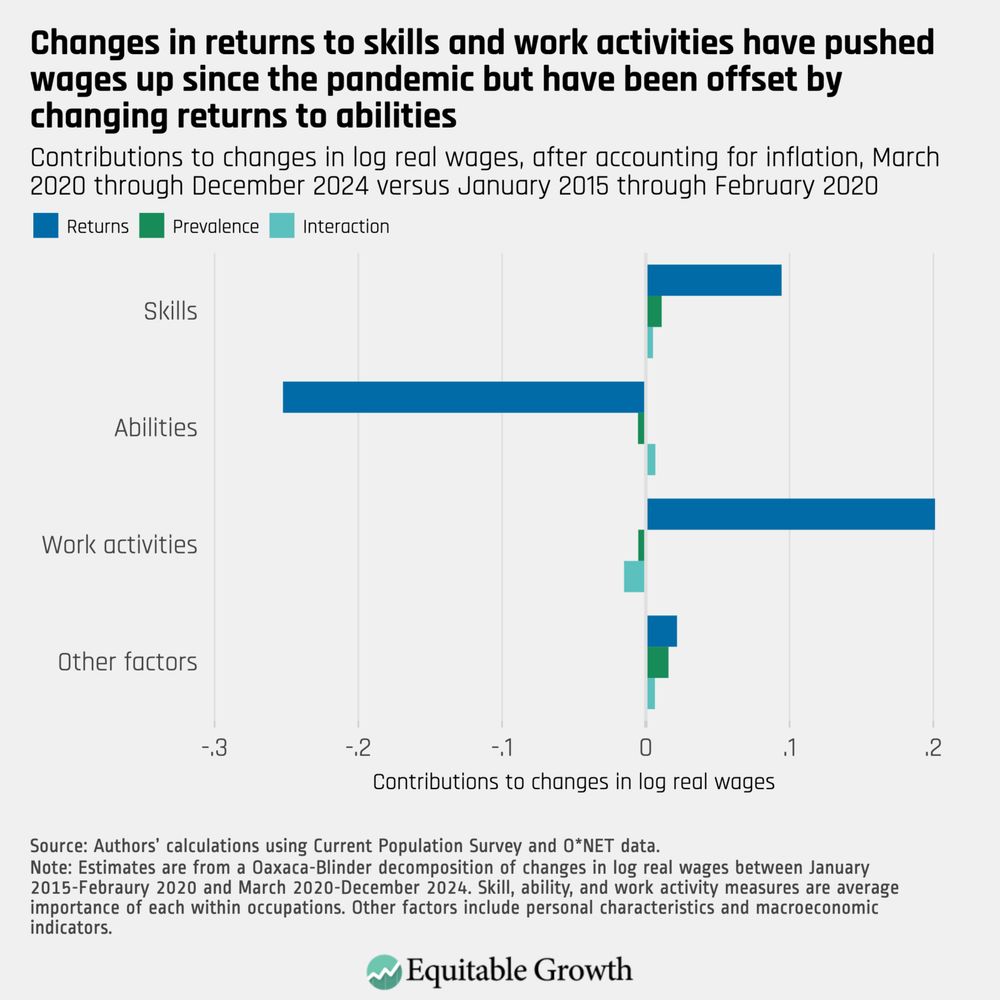
May 8, 2025 at 5:40 PM
I want to highlight some cool stuff in this piece:
1) we decompose the change in real wages from the ~5 yrs before the pandemic to the ~5 yrs after. Despite all the talk about the Great Resignation/Reshuffle, changes in the content of the average job didn’t play much of a role.
1) we decompose the change in real wages from the ~5 yrs before the pandemic to the ~5 yrs after. Despite all the talk about the Great Resignation/Reshuffle, changes in the content of the average job didn’t play much of a role.
Why do some jobs pay better than others? Think about what workers do! We tried to start doing this in an @equitablegrowth.bsky.social piece this week. We look at how skills, abilities, and work activities from O*NET relate to wages.
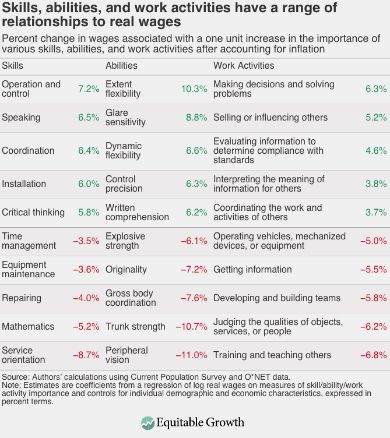
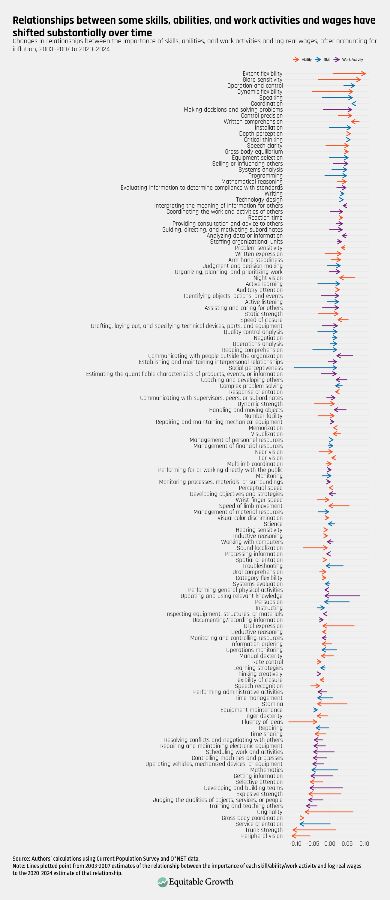
May 8, 2025 at 5:40 PM
Why do some jobs pay better than others? Think about what workers do! We tried to start doing this in an @equitablegrowth.bsky.social piece this week. We look at how skills, abilities, and work activities from O*NET relate to wages.
3. Is anything different about occs where wages are under-predicted by job content? Yes! They’re more likely to require professional licenses, and they’re more likely to involve telework.

May 8, 2025 at 5:39 PM
3. Is anything different about occs where wages are under-predicted by job content? Yes! They’re more likely to require professional licenses, and they’re more likely to involve telework.
2. O*NET job content measures, despite being measured at the occupation level, explain about 30% of the variation in individual wages over the last 5 years, which is pretty good. But they systematically under-predicted wages within high-paying occupations.

May 8, 2025 at 5:39 PM
2. O*NET job content measures, despite being measured at the occupation level, explain about 30% of the variation in individual wages over the last 5 years, which is pretty good. But they systematically under-predicted wages within high-paying occupations.
I want to highlight some cool stuff in this piece:
1) we decompose the change in real wages from the ~5 yrs before the pandemic to the ~5 yrs after. Despite all the talk about the Great Resignation/Reshuffle, changes in the content of the average job didn’t play much of a role.
1) we decompose the change in real wages from the ~5 yrs before the pandemic to the ~5 yrs after. Despite all the talk about the Great Resignation/Reshuffle, changes in the content of the average job didn’t play much of a role.

May 8, 2025 at 5:39 PM
I want to highlight some cool stuff in this piece:
1) we decompose the change in real wages from the ~5 yrs before the pandemic to the ~5 yrs after. Despite all the talk about the Great Resignation/Reshuffle, changes in the content of the average job didn’t play much of a role.
1) we decompose the change in real wages from the ~5 yrs before the pandemic to the ~5 yrs after. Despite all the talk about the Great Resignation/Reshuffle, changes in the content of the average job didn’t play much of a role.
Why do some jobs pay better than others? Think about what workers do! We tried to start doing this in an @equitablegrowth.bsky.social piece this week. We look at how skills, abilities, and work activities from O*NET relate to wages.


May 8, 2025 at 5:39 PM
Why do some jobs pay better than others? Think about what workers do! We tried to start doing this in an @equitablegrowth.bsky.social piece this week. We look at how skills, abilities, and work activities from O*NET relate to wages.
The number of pages unavailable is large, but I think doesn’t give the full context here. The full Center for Economic Studies working paper series is unavailable. That’s the work of CES staff and coauthors but also anyone working through an RDC. www.nytimes.com/2025/02/02/u...

February 3, 2025 at 4:22 PM
The number of pages unavailable is large, but I think doesn’t give the full context here. The full Center for Economic Studies working paper series is unavailable. That’s the work of CES staff and coauthors but also anyone working through an RDC. www.nytimes.com/2025/02/02/u...
No excuses for bad jobs/immigration punditry this week, courtesy of @jedkolko.bsky.social in @briefingbook.bsky.social www.briefingbook.info/p/population...

February 3, 2025 at 12:58 PM
No excuses for bad jobs/immigration punditry this week, courtesy of @jedkolko.bsky.social in @briefingbook.bsky.social www.briefingbook.info/p/population...
Thanksgiving is a distant memory at this point, but the initial claims volatility is still with us, though probably not for much longer. NSA, this year's claims actually look a lot like years when Thanksgiving was earlier.


January 16, 2025 at 2:55 PM
Thanksgiving is a distant memory at this point, but the initial claims volatility is still with us, though probably not for much longer. NSA, this year's claims actually look a lot like years when Thanksgiving was earlier.
Lower interest rates, plus various things the incoming Trump administration seems poised to pursue, would put upward pressure on prices. Despite that, Republicans believe inflation will decline over the next year.



January 13, 2025 at 3:03 PM
Lower interest rates, plus various things the incoming Trump administration seems poised to pursue, would put upward pressure on prices. Despite that, Republicans believe inflation will decline over the next year.
At the same time, people across parties (but especially Fox News viewers) believe interest rates are too high.



January 13, 2025 at 3:03 PM
At the same time, people across parties (but especially Fox News viewers) believe interest rates are too high.
This shift among people on the right does not reflect new priorities. They (like everyone else) still care most about inflation. Concerns about rising employment are much less prevalent.



January 13, 2025 at 3:03 PM
This shift among people on the right does not reflect new priorities. They (like everyone else) still care most about inflation. Concerns about rising employment are much less prevalent.
Changes in expectations are driving the partisan divergence in sentiment. People in redder places became much more likely to think they would be better off in a year after the election than before. Changes in how people say they’re doing today or relative to 2019 were similar/small across places.



January 13, 2025 at 3:03 PM
Changes in expectations are driving the partisan divergence in sentiment. People in redder places became much more likely to think they would be better off in a year after the election than before. Changes in how people say they’re doing today or relative to 2019 were similar/small across places.
Toady in @briefingbook.bsky.social, @leofeler.com, Jack Chylak, and I dig into consumer sentiment changes since the election. As expected, Republicans started liking the economy right after the election, and Democrats started hating it. But what it’s going on below the surface?

January 13, 2025 at 3:03 PM
Toady in @briefingbook.bsky.social, @leofeler.com, Jack Chylak, and I dig into consumer sentiment changes since the election. As expected, Republicans started liking the economy right after the election, and Democrats started hating it. But what it’s going on below the surface?
This can’t be real

December 31, 2024 at 8:34 PM
This can’t be real
I will, just this once, get off the bench to post about initial claims. I think it’s pretty much just seasonal adjustment.

December 12, 2024 at 4:07 PM
I will, just this once, get off the bench to post about initial claims. I think it’s pretty much just seasonal adjustment.
Others have covered important reasons to appreciate @pkrugman.bsky.social. More personally, I've appreciated the links he's dished out to @briefingbook.bsky.social contributors over the last ~year. Other than our launch, every growth spurt we've had has come after a Krugman link. What a blogger!

December 6, 2024 at 7:09 PM
Others have covered important reasons to appreciate @pkrugman.bsky.social. More personally, I've appreciated the links he's dished out to @briefingbook.bsky.social contributors over the last ~year. Other than our launch, every growth spurt we've had has come after a Krugman link. What a blogger!

